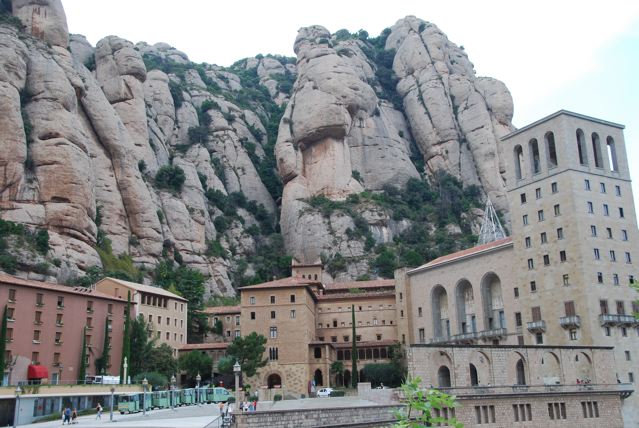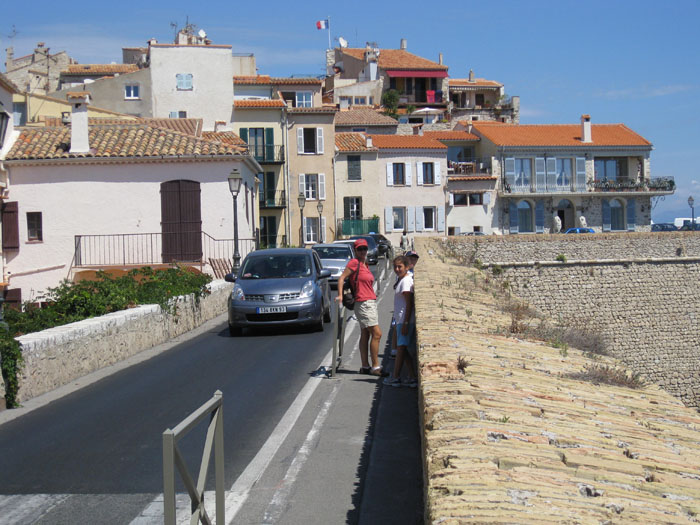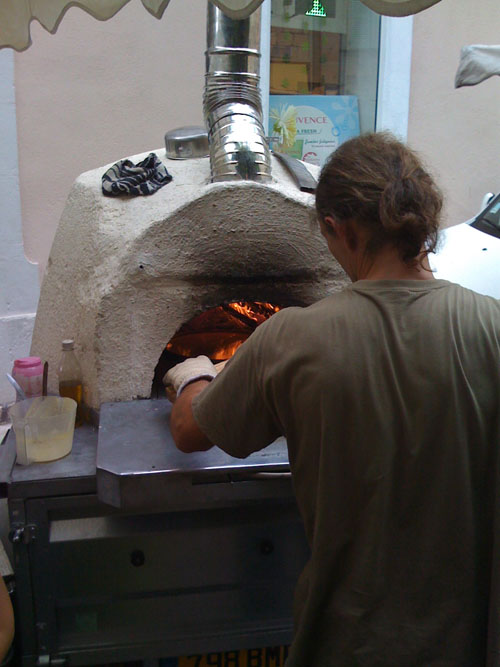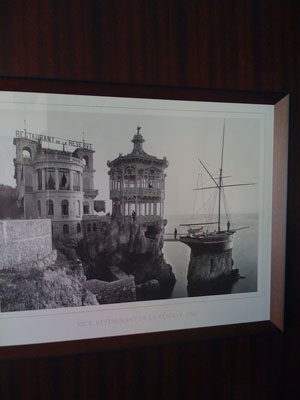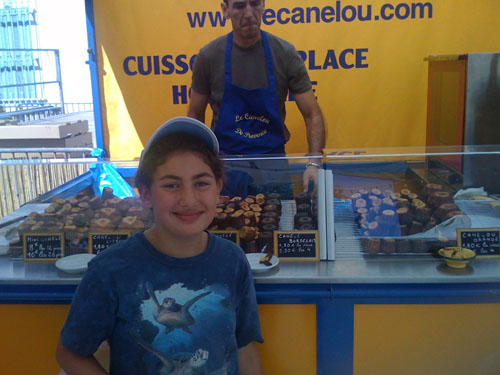Archive for August 2008
Having spent some more time here, we really think Fayence is a beautiful hillside town. Our house is close enough to walk everywhere, and we even walked over to the neighboring small town of Tourettes two mornings. Fayence has a market three days a week full of great produce, meats, cheeses, clothes, toys, linens, etc. and there are additional artisan markets some evenings. There are several restaurants, and the two we’ve eaten in so far – La Farigoulette and Restaurant La France – have both been spectacular. The meat at La France was delicious served with a brown butter sauce with mushrooms. Then the fish at La Fagoulette was roasted and served with fennel greens and fennel pollen – amazing. Equally, appetizers and deserts at both places have been excellent. I was surprised to see so much raw fish being used here, but I suppose that we aren’t more than an hour from Italy, and they do make plenty of crudo over there.
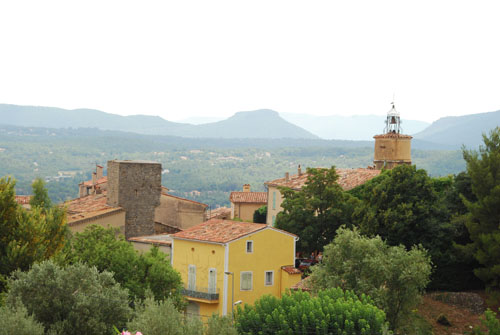
The view from our house, of the town and clock tower in Fayence
We went into Antibes for a day trip. For a beach town, there isn’t a lot of great beach. But the old city is nice, the food we had was good, and the Picasso Museum (closed, of course, the day we tried to go) looked to be pretty interesting as it’s located in the Grimaldi Palace, right on a cliff in the old city. We tried to go to the beach and do a bit of snorkeling, but we just got in the water when it started to rain, then Leo spotted a pretty large jellyfish, and so we called it a day. So did many others, it seems, so the road out to the A8 was very slow-going.
The other day trip we did was to Nice. Here, we did two long walks: one through the old town and one on the Promenade des Anglais to the Quai des Etats-units and up to the castle hill. I remember the rocky coastline of Nice, but I didn’t remember how painful it is to walk on without sandals. Wow. And the waves were really crashing that day, which is normally a good thing, but in this case, it meant that we couldn’t easily get in or out of the water. Once you got beyond the break, coming in was tough because you’d get pounded on the rocks, try to stand, hurt your feet, and get swept up in another wave. Next time I’ll get some water shoes – if I bother with a next time. I now see the value of a sandy beach.
The food of Nice is really pretty excellent. Besides the pebbled beaches, my other etched memory of Nice from more than 20 years ago is of the pan bagnats. A pan bagnat is basically a big roll (they claim it’s unique to Nice – it’s sort of like a large soft Kaiser roll with no seeds and a good flavor) sliced in half, doused in olive oil and salt, and then layered with lots of things, almost always including tuna, hard-boiled egg, anchovies, tomato, lettuce, and olives. I’ve also seen peppers and onions in some. It’s a pretty big, and cheap, way to eat, and that’s likely why I first tried it when I was a starving student. But it’s great, and the one I had in Nice made me want to make them at home. Mine was just from some window cafe – but I had a better, haut cuisine version that night.
The other food we found that seems to have its origins in Nice (although we had more of it in the market in Fayence) is socca cakes. These are large pancake or crepe-like flatbreads. You get a piece of the bread, often sliced up into smaller pieces. The best ones we had are the ones in Fayence, but the “queen” is apparently in Nice at the market – Therese. I couldn’t handle her haughty attitude or the line, so we didn’t get a chance to taste, but we did get to see her verbally abuse some customers – who took it, I suppose as a testament to how good her socca cakes were. In any event, they’re made with chickpea flour, so they have a different flavor, and a golden color. They’re pretty addictive. These, along with the pan bagnat, and the Nicoise salad, are the local indigenous foods.
So after walking quite a bit and getting thrown around on the beach in the waves, then hurting our feet on the pebbles, and making four or five trips into the fiery inferno where we parked our car, (four levels below the Place Massena), we went for a fancy dinner at La Reserve, which is around on the other side of the port. That meant we could drive and likely park there (plenty of spots) so we wouldn’t have to go back into the dungeon for the car after dinner.
The restaurant has been there for some time, but they have a new chef recently, and his other restaurant in Nice has a Michelin star. So we figured we should do OK. We did.
This place was pretty expensive, but when you eat at this kind of place, you end up with a lot you don’t expect. We started with an amuse (eggplant stuffed with ricotta) and then breadsticks and bread, each served separately. Then we were served local vegetables lightly boiled and then served in a cold, watery pistou. That was very refreshing – even the kids were happy about it. We had our appetizers, and Christina and I had nouvelle pan bagnats. These were definitely a step up from the ones in town for 4€ (not that those aren’t good, too). But the ingredients were just delectable and the tuna was fresh and seared and the olive oil was fruity and the flavors together were great.
After we were served the entrees, we discovered that of the four menus we had used to order, only one had prices: mine. Christina had no idea was the meal cost. That was pretty old-school. It’s been so long since I’ve seen that that when I last saw it, I didn’t have the one with prices.
Anyway, the meal proceeded through the cheese (reblochon, chevre, brillat-savarin, and roquefort), the pre-dessert (berry sorbet with fresh berries and fraise de bois), the desserts (actually, probably the least memorable course) and then the coffee and the little extra truffles and fruit jellies and macarons. Turns out they also have good WiFi.
More about Fayence
OK – so those are the big trips we took outside of Fayence. But staying in Fayence (which we did for several days) is really pretty wonderful. The town is about 1000 feet up, and just less than an hour from Nice, north of the A8. Our house, very generously lent to us by a friend of Christina’s, was a very short walk from the commercial area of the town – essentially the old town, a typical medieval hill town. The town has a bell tower (that seems to compete with the bell in the church, the church typically sounding the hour and the half hour about 10 seconds before the belltower), remnants of old walls, and a nice square for the market that occurs Tuesdays, Thursdays, and Fridays. The market has several different vendors, some of whom I’ve only seen once, while others come each time. The socca cakes, as mentioned above, are addictive. At Chez Regis, Regis can tell you who the family is that makes each cheese, and how long each individual crottin has been aged, and where and how long each ham has been smoked. He promised us the best roquefort that we’d ever have, and, two days later, he had it, and it was creamy, salty, tangy, and marvelous. All of the vendors at the market are extremely friendly – sometimes even flamboyant – and they take all the time they need with each customer. Sometimes, this drove me nuts, as when you aren’t the customer being lavished with time, you’re waiting for that customer to be finished. I know that’s just the way it is here and I could be more patient, but I’m sure I would have patronized more vendors if some transactions were completed a little more quickly. We spent a long time tasting cheeses and meats in Regis’ shop, just a bit up the hill, and the kids were about to expire by the time it was over. I kept saying, “fine, we’ll take X amount.” And Regis would say, “but you must taste it first, and compare it to the other.” It really was a very generous attitude, both of his time and his product.
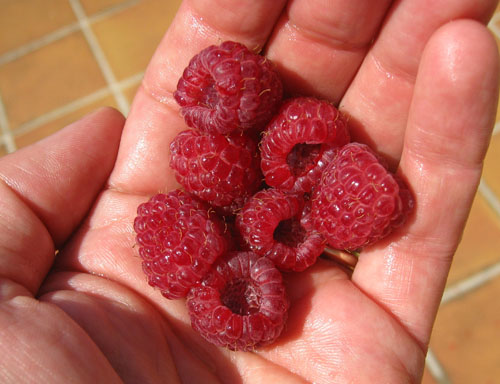
Best raspberries ever - from the market, amazing
So the town also has a bakery, a butcher, a small grocery store, a wine cave, several local products stores, and many restaurants. I’m surprised to say that there are more restaurants here than we’ll get to. In the old part of town with windy lanes with steps, each time you turn a corner thinking it’s all residential, you find more artisans or restaurants.
We actually ate several lunches and one dinner at home with products from the local stores and the market, but the restaurants have really been pretty exceptional also. We ate at La Farigoulette one night, and enjoyed it quite a bit. That restaurant seems to get some press – it’s closest to the back street where our house was, and we couldn’t get in the first night without reservations. Christina and I both had types of fish that we’d never heard of before. We left knowing that we’d happily return, if we had time.
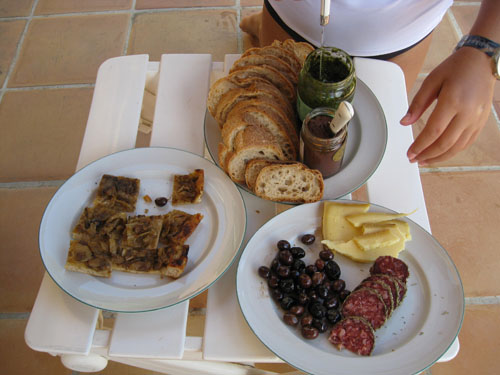
Our first market meal: pissaladiere, saucisson, olives, cheese, tapenade, and pistou
Another night we ate at Restaurant La France which is just above the main street at the main crossroads – or crosswalk, really: the main cross street is really a slow stairway in each direction. The meat that Leo (lamb) and I (beef) had here was truly amazing. His was roasted with thyme, and mine with mushrooms and brown butter. Another slam dunk, all the way through.
The creperie made for a nice snack one day – nothing too unusual, but solid.
The cafe right in the heart of town (Bistrot Fayencois) on both sides of the main road was really pretty ordinary, and, even though they promised WiFi, that was only intermittent. I will say that what was kind of interesting about this place was that the restaurant itself is on one side of the main road, and their outdoor eating area is on the other. So the waitstaff is constantly crossing through traffic with food and dirty plates. It seems crazy, but we saw it repeated in other places. But don’t go for the food – it’s really the right place for a drink only.
The one feature that the town seemed to lack was good WiFi. But I finally found it! At the Espace Culturel – the cultural center and movie theater – there’s good, free WiFi. I couldn’t use VoIP with it, but for browsing and email, it was rock solid. Only problem is, you need to be down at the level of the theater doors to go get to it, and they often seem to lock the plaza sometimes so you can’t get the WiFi. But when you can, it’s good.
One night we ate at Le Canotier, which is still in the old part of town, but much lower down, where the main road switches back. It’s a quick, steep walk, and the pizza and salads were very good. Even better, the service was wonderfully friendly and the staff really seemed to enjoy their jobs and the evening.
On our last day, we drove over to Callians just to catch a glimpse of another hill town. This one is a bit smaller than Fayence, but it basically has the same idea: dense, old section, anchored by a church and a clock/watch tower. Bells ring every hour (and a single bell on the half hour). And here, we had an amazing lunch, at an Italian restaurant called Rendez-vous. They brine their own olives in-house (we got a jar to take home) and they pretty much fired on all cylinders, including dessert. The setting couldn’t be prettier, on a patio overlooking the hills in the distance. I had a plate of local cooked/roasted/prepared vegetables with some cheese and meats, and Leo had a great steak tartare. Maya’s tomato and mozzarella salad had some crazy heirlooms on it, and Christina’s rocket and parmesan had probably the best green leaves we’d tasted all trip. Great quick day trip (10 minutes away) and a great lunch.
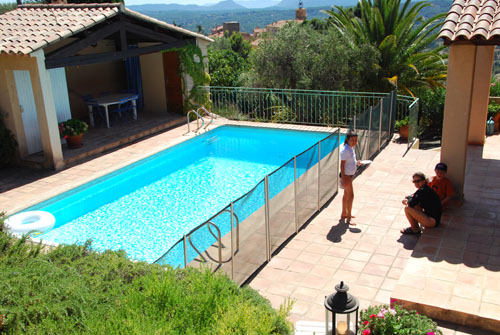
The pool at the house in Fayence
Our last night in Fayence we ate at Les Temps du Cerises, which is apparently the name of a song by Henry Mancini. This place had a bit more of an international fusion menu, but still pretty French compared with the fusion you’d find in LA. We’d had the local vin du pays which I kept seeing in the farmer’s market: Val d’Iris. I’m getting a little liking of French wines, and this one seemed pretty solid. Leo had, yet again, a great steak, and I had lamb with Asian spices. But the best part was the dessert. I got a sampler plate of all six desserts, including a sour and tangy berry soup, and a creme brulee that had a nice but slight burned flavor on top.
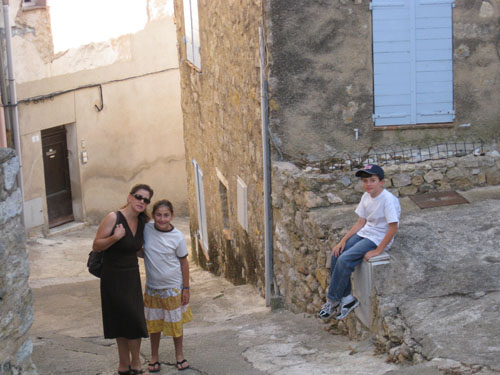
Walking through Fayence on the way to dinner
So from there, all that remained was for us to pack all of our bags, slice up some baguettes to make sandwiches for the plane, and head to the Nice airport. Great trip.
This day was so long and crazy, this post is only about our transportation to France. I’ll be back with more info about Fayence in particular, and the remainder of our trip, after it’s over. The previous blog post has info about our week in Sitges.
So after a week, it was time to go to France. We had rented a car in Barcelona for the week (a Renault Leganza – a real boat. Christina thought it was maybe a Chrysler since it has so many elements of a cheap American car. Renaults must be the lowest rung of French cars. The clutch had a terrible springiness, and first gear was almost impossible to find instead of third. It definitely felt like I was driving a Crown Vic.). (I won’t go to far into my digression about how the cheap car makers use names for cars, while the better companies use numbers for their models – but someday . . .) We had to return this car in Barcelona, take a train over the border to France, and rent a car there. Renting a car in Spain and returning it in France is extremely expensive due to some European regulations. So when I called AutoEurope (really helpful people there) they recommended just doing two cars with a train in between. Christina wanted to get a train involved in the trip, so we reserved two cars, each for a week.
The train we needed turned out to be the same train that the Koetters were taking to Paris. But they had tickets and we didn’t. I almost bought them online, but I was a bit shocked to see them at $178US for the three hour ride – and that’s each person. Finally, when I couldn’t buy them online anymore (for some reason, they don’t seem to have e-tickets, so you have to buy them online five days before the trip) I went to the train station in Sitges to buy them. But they can’t sell them. Only the main stations in Barcelona can. So we decided to just show up and go from there.
That morning, early, we took the car back to the airport, and took the airport train to Barcelona Franca, only to find a “Montpelier – sold out” sign at the ticket office. And it said they were sold out for the next three days. So the ticket agent told us to rush back to Barcelona Sants, jump on an 8:30 to Cerbere (right across the border) and then get a train from there to Perpignan, where our car was waiting. So we ran, go on the train to Sants, and missed the train to Cerbere by five minutes. If anyone is reading this and wants a tip – the guy should have told us to get off at Passeig de Gracia, which eliminates two legs, and thus ten minutes, and would have gotten us on that train.
In any event, the next train was three hours later. So that put us pretty far behind schedule. We checked through the options: other trains (nothing), taxis (crazy expensive, and they didn’t seem willing to even do it), busses (seem to be pretty frowned upon by all we asked for info, and the best info would have taken us another subway ride to get), and one day rental cars ($900). We decided to wait the three hours. We bought tickets (34€ for all four of us) to Cerbere. After some snacks, we got on our third train of the day, after a last-minute track change. This wasn’t too bad – we got seats together and a place for our luggage. But the train was packed. Then, three stops later, the conductor announced that passengers to Cerbere had to, instead, switch to another train. Half this train was French, and most were foreigners, so everyone was helping everyone else figure out what to do, and we all got off this train on to another one, smaller, one level, and even more packed.
Here, a very, very nice Frenchman asked a man to move his luggage so Christina could sit, and she really needed it. He was very chivalrous, and that was the first of several pieces of help he graciously offered to us. Leo and Maya sat on some of our luggage in the aisle, and I stood/leaned, crushed in the group near the door. I will say that, after the initial jostling for space, all of those I was with in the mosh pit were very nice and respectful, and everyone understood that we were in this mess together, and to try to make the most of it. So even though it was painful positionally, the attitude was very positive. At one stop, by which I had made my way to the aisle with the rest of the family, a woman and her two kids got on. The kids were pretty young, and again the same Frenchman helped. We also tried to make room for them, but one kid couldn’t even stand, he was so tired. A woman, must have been a grandmother, probably Russian, took the kid on her lap, and he fell asleep almost immediately. Slowly, as people got off, the situation improved. Finally, an hour and a half in, by Figueres, even I had a seat.
So we arrive in Cerbere and need to get to Perpignan. We knew the train left about 75 minutes after we arrived, but we were late, so we had less than an hour. We waited in both lines – for the one ticket agent, and for the one automated machine. And waited. And waited. After almost no movement in our line, Christina got to the front of hers with the machine, so I went over to help. I had spoken with the helpful Frenchman in my line and pointed the machine out to him, so he had gotten in line just behind Christina, luckily.
I left the kids in the ticket agent line and went over to the machine. For an automated machine, this thing was interminable. And slow. And there was only one. The questions about options went on ad nauseum. Did the first adult have any special discounts? Non. Did the first adult have an SNCF pass? Non. How about the first child? Each question was slow, and totally unnecessary. How about a ‘special-options’ button or something? It probably took five minutes just to get through that, and the line behind us grew.
Then, time to pay. The machine takes, among other cards, Visa and Mastercard. Except that it doesn’t. Between us, we produced six different Visas from our wallets. None worked. Cash wasn’t accepted at the machine. Enter the chivalrous Frenchman. I couldn’t thank him enough for buying our tickets (22€). And we were able to pay him back with exact change. We later wondered what we would have done if he wasn’t there – I think I would have offered 50€ to anyone in line who would buy these for us with their credit card. In the end, with the painful delay and hot, crowded trains, and taking four trains instead of one, we did save $600, so all wasn’t lost. And the kids got a taste of traveling in Europe like a student instead of like a family that properly prepares for these connections.
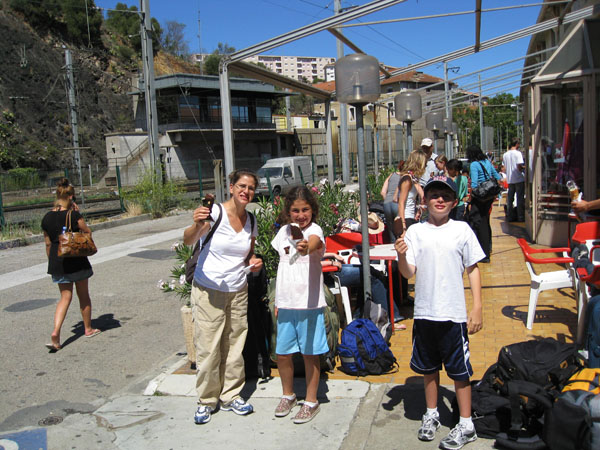
Some ice cream after we finally got the train tickets in Cerbere
And, so, we got to Perpignan, after a 45 minute train ride. This time, we all had seats pretty near each other, but, alas, no air conditioning. Nothing’s perfect. But it was short.
We knew we still had a four-hour-plus drive to Fayence where we were staying for the next week. We got to AutoEurope and picked up our car. I have to say, I was hoping for a VW or a Citroen or a Peugeot after that Renault. Amazingly, we got a BMW. I’ve really never driven one a long distance before, and I have to say, having this car for the drive made it much more enjoyable. The car was a 118i, so it was pretty small, and sporty. We just barely fit all of our luggage in, and headed off, with the Garmin in charge. The first leg, to Montpelier, was riddled with stop and start traffic, that it was totally painful. What should have taken about one hour took well over two. But then we started really moving, about 160 km/h, and covering some ground, finally.
We stopped at an awful highway restaurant and I saw an andouillette that looked good, since I was so famished. Waiting for the rest of the order, I started in the french fries. They do it best. Amazing. But the andouillette was truly horrific. Leo’s burger was pretty bad, too. But they had a salad bar with steamed leeks, roasted fennel, and other salads that made up for it.
Finally, at about 11 PM, we got to the house in Fayence that was lent to us by a friend of Christina’s. We really had no idea what to expect, and (writing from the porch, overlooking the hills of Provence) I’d have to say that I’m completely amazed by both the house, and the substantial, pretty, walkable hill town that’s a three minute walk away. We haven’t yet explored a ton, but we went to the Sunday market, bought tons of local foods, milled around, had some local wine, and just took in Provence. So far, so good.
We spent the first week of our summer vacation in Sitges, a beach town just south of Barcelona. We rented a large condo with our friends, the Koetters.
The condo (Residencia La Granja) was on Vilanova about four blocks north of the beach, an easy an pretty walk. The condo had a central pool, and, after a start, WiFi, which meant we could use Skype and Truphone to call home and research trips.
Sitges is a fairly large town with an old neighborhood with an old church at one end, and a newer town stretching west from there. For the first several days we were in town, we didn’t realize just how much there was in town – it wasn’t until our last day that we found the doner kabob shop.
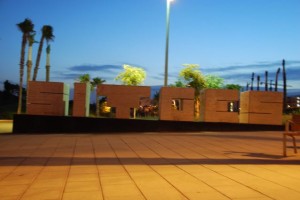
After a few meals at local places that we happened upon (including two pizza places on the street at the beach that were fine, but nothing special) we decided to try to do some research and eat at less touristy and more compelling restaurants. Our Cadogan guide led us to La Masia, which was a complete mistake (and the guide was therefore left at the condo, and was pretty much never re-opened). To compound the problems with the restaurant, we used our Garmin, that we loaded with maps of Europe, to find the place. It led us in exactly the wrong direction, right to downtown Sitges, instead of the relatively easy walk the other way down Vilanova to the restaurant. In any event, the sausage tree was pretty unusual and did have some good meats hanging from it, but from there, everything was mediocre, or even bad. The place was only populated with English-speaking tourists, and it was only about 10% full at that. We agreed that it may be a tour bus stop. So, clearly, don’t waste your time here. Avoid La Masia!
More research on Sitges led us this website of restaurants in Sitges, with a little commentary.
That helped a bit, and it did lead us to Izarra, near the top of Carrer del Taco on Carrer Major. This is a fairly typical tapas bar with a pretty large selection for such a small place. The specials were 3.50€ which made those items a steal. We ordered all four (only got three) and the pimientos de padron and the patatas con cabrales were great. The other memorable items were, especially, the rice dish (sort of like paella, but with mushrooms and meats) and a great lentil and potato stew with sausage. That one was my favorite. The Mediterranean salad was also very good – I think it had the local Cabra cheese on it, which is a bit like Boucheron to me, with a chalky part and a creamy edge before the rind.
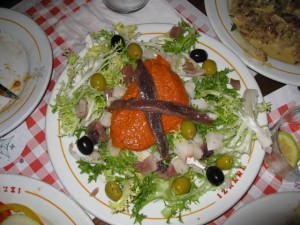
The other good restaurant we ate at was El Rato de Carreta around the corner from Izarra on Carreta. This was more or a typical restaurant and they had a speciality of ‘cocos’ which seem to basically be take-offs on the idea of the Pan Amb Tomaquet that you can get everywhere in Catalunya (and that’s usually a really solid way to start a meal). The cocos here had other toppings – mine had eggplant, onion confit, and roasted tomatoes, in three sections, divided by anchovies. This restaurant also had good salads – mine had Cabra, again. Leo had a rich, meaty lasagna, and Christina had an eggplant dish with cheese that was just too much food, but also good. I will say that, as is often the case here, the service was pretty slow, but nice and accurate. The one guy who likely owns the place is the waiter for the whole restaurant, and once it gets full, that’s the end. When we left, at about 10:30, there was a line out the door. Of course, we could have left 45 minutes earlier and made space for these people (and money for the guy) with a little more attentiveness, but that’s just not the way it works in Europe, so it seems. It almost makes me like the way we have tips in America – at least there’s some reward for efficiency, and it aligns the interests of the waitstaff with that of the owners and customers.
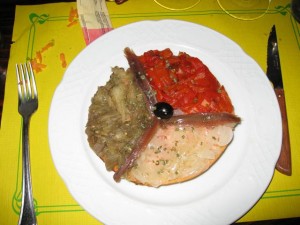
The other restaurant where we ate once, and the Koetters, twice, is Bar Panchito. It’s a Mexican place, just south of the traffic circle in the middle of town. It’s fairly quick, actually pretty tasty, and not at all accurate in its descriptions. If you have any knowledge of Mexican or CalMex food names, just ignore them for purposes of ordering here.
Trips outside Sitges
Twice, we went into Barcelona. Once was by slow train, and once by car, which, having given the Garmin GPS another shot, was really pretty easy. Even parking wasn’t too bad, and I’d do it again by car considering the experience.
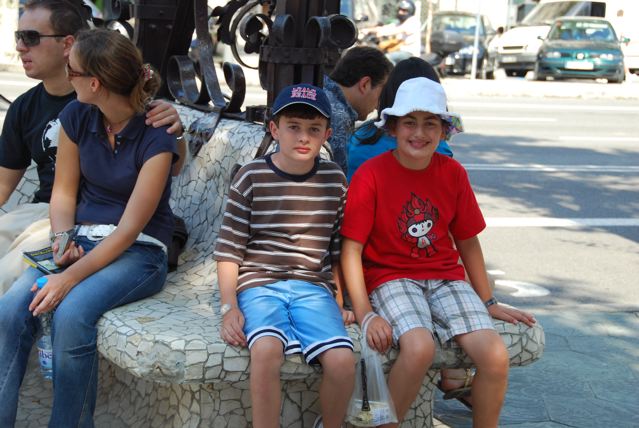
We ate lunch at Cacao Sampaka, the chocolate store and cafe that we went to last trip and found stunning. This time, it was less so, maybe due to the sour attitude of our server. That really put a damper on things. But the chocolate was good – both what we ate there, and what we brought with us for later snacks. The chocolate covered orange rinds are really the best.
From there we walked around to see some Gaudi houses include Casa Battlo and Casa Mila (La Perdera) and some other notable architectural buildings, then to the church.
The first time we went to the Sagrada Familia which is just amazing. I hope I’m alive to see it when it’s finished. We saw it a few years ago, and I can’t really tell at all what’s different, but it’s really just stunning. This trip, I was especially taken with the angular art on the front of the church, outside, but a local, living artist, whose name I forget.
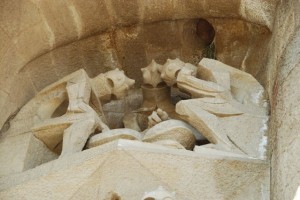
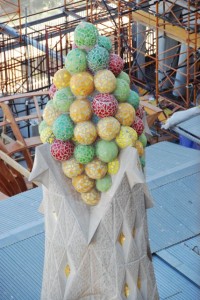
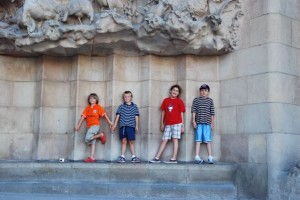
Next trip into Barcelona we planned out a bit more and Klara found us a great tapas restaurant on Chowhound. We had all wanted to go to Cal Pep, but they’re closed for the month, so we went to Paco Meralgo. This is in a totally different part of town, but with the metro and the easy parking, we all met up there easily and got to our reserved table. Quick note: if you’ve got nine people, or even fewer, make reservations at these places when you can. They seem happy to help, and I think that without this reservation, we wouldn’t have had a chance at a table for all of us.
It was hard to order the wrong thing here, but top picks included the steak tartare, the padron peppers, the razor clams, and, maybe the raw sea snails. I didn’t expect those to be raw, so that was a new one for me, but they were really tasty, and had that great chewy texture, and they were a little chilled. As Joe noted, dipping almost anything in drawn butter with garlic helps, and it didn’t hurt these one bit. The tuna carpaccio that was so highlighted on Chowhound was nothing special (but then, coming from LA, it’s hard to get raw fish that impresses) and even the desserts were great – I liked the french toast the most, and thought the Catalan cream (basically, creme brulee, but a bit more rustic) and homemade cheese were great also. Others like the cork in mocha sauce that didn’t really do it for me.
That day we also went to Parc Guell (incredible – hallucinatory) and the Miro museum (which I like, but I found better the first time). We hit the Boqueria for a bit, then ate back in Sitges.
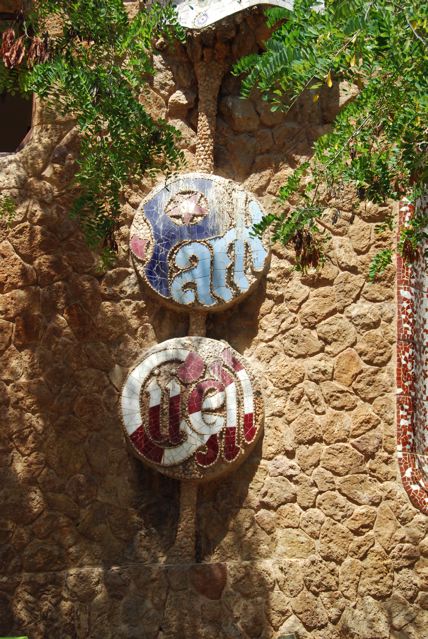
We also went on a trip to Montserrat. This is on a crazy geological formation that you see rising up from miles and miles away. Eventually, after what seems like lots of back and forth driving, you wind up to the site of the monastery and town, high up in the jagged peaks. Most of the church is relatively new, having been destroyed by Napoleon’s troops in the early 1800s. But the sculpture of the virgin from the 9th century is still there, healing people. We took a hike up to the highest peak. The place reminds me of Ayers Rock since it’s just totally alone out in the countryside, with nothing even remotely similar around.
